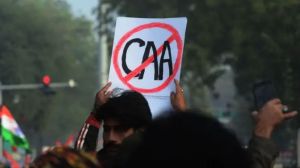Carry on Minister
When results of the 1999 Arunachal Pradesh assembly elections were declared, Gegong Apang found he was reduced to a one-man opposition. The ...

 When results of the 1999 Arunachal Pradesh assembly elections were declared, Gegong Apang found he was reduced to a one-man opposition. The Congress under Mukut Mithi won 59 seats out of 60. Many political watchers were tempted into writing Apang’s epitaph but the man who had been chief minister for 19 years proved them too hasty.
When results of the 1999 Arunachal Pradesh assembly elections were declared, Gegong Apang found he was reduced to a one-man opposition. The Congress under Mukut Mithi won 59 seats out of 60. Many political watchers were tempted into writing Apang’s epitaph but the man who had been chief minister for 19 years proved them too hasty.
Defection is not new to the Northeast but Apang’s return to power last week after he switched over to the Congress, crowned him master of the art.
Born in an obscure village—Karo in the Upper Siang region of Arunachal Pradesh—Apang, 57, joined the Congress in 1972, fresh out of college. He became agriculture minister in 1977 and was subsequently elected to the first legislative assembly in 1978 to be given dual charge—agriculture and public works. Elected chief minister in January 1980, he held on to the seat for 19 years.
In these years he showed a considerable flair for long-winded speeches. On one occasion an anxious George Fernandes had to tug at his kurta to hurry him up. At another time an impatient Mulayam Singh reportedly asked him to cut short his speech after listening to him for thirty minutes.
Apang has been as prolific with political parties as he is with words. When the Congress lost to the United Front, Apang formed the Arunachal Congress, in protest over the Congress “highhandedness”. His unstated intention was to be with the government at the centre.
IN 1999 came the first break from power. His Arunachal Congress government was toppled by former home minister and Congressmen Mukut Mithi. A few months later Apang’s party was wiped out in the elections. But even then his hold and reputation as a host was such that journalists often landed up at his dinner parties rather than the CM’s.
He then weaned away 42 members of the Congress, creating the United Democratic Front in July 2003. Soon after becoming chief minister, he merged his party with the BJP saying ‘‘this is the party that Arunachal needs’’ and continued to rule till elections were announced for the state assembly last month.
The shift at the centre naturally meant a shift in allegiance. So, even as he was just a caretaker chief minister, Apang switched over to the Congress. ‘‘Soniaji has done a lot for the country. I am proud to be back in a party which believes in secularism,’’ he says. And just last year he had declared: ‘‘We will leave no stone unturned to fulfill the dream of prime minister Atal Bihari Vajpayee of bringing the Northeastern region into the national mainstream.’’
Apang, however, can’t afford to rest on this victory alone. The Congress got just 32 seats, the Independents managed 12 and the BJP for the first time won eight. Within the party too there is some resentment. Takam Sanjoy, who was instrumental in ousting Apang in 1999, has warned that Arunachal would be ‘‘heading for danger’’ with Apang as chief minister.
Meanwhile, the Guwahati High Court has asked the CBI for a report on the Rs 124 crore scandal in the state’s power department during 1992-95 when Apang held the power portfolio.
But Apang’s past record shows that these obstacles are in all probability temporary, unlike his seemingly permanent chief ministerial status.



- 01
- 02
- 03
- 04
- 05




























